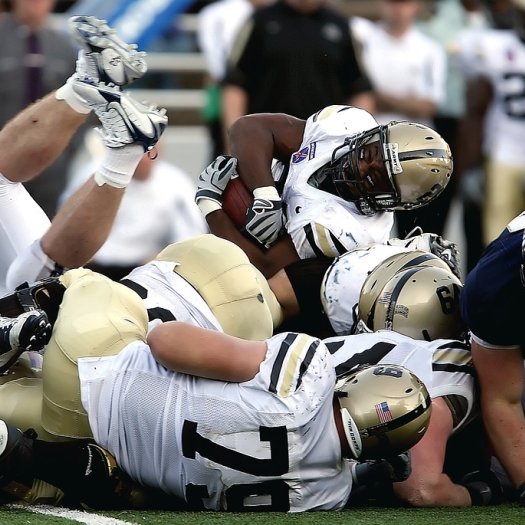For 22 years, quarterback Tom Brady shaped the NFL like no player before him: Brady won seven Super Bowl titles with the New England Patriots and the Tampa Bay Buccaneers. Brady is to American Football what Michael Jordan is to the NBA or Pele to football. He has long been regarded in the NFL as the "GOAT" - Greatest of all Times. This season, even at 44, he was still playing at the highest level. Nevertheless, Brady announced his retirement on February 1 .
And he is not the only established player to quit: "Big Ben" Roethlisberger, quarterback of the Pittsburgh Steelers for 17 years and two-time Super Bowl winner, is also calling it quits at 39. With 38-year-old Aaron Rodgers of the Green Bay Packers, the next superstar has left his future open. The NFL is losing faces that have shaped it for decades.
But the new generation of superstars is already waiting in the wings: Patrick Mahomes, whom the Kansas City Chiefs have signed to a $500 million contract, is considered the man of the future. He is joined by youngster Joe Burrow, who in his second NFL year led his Cincinnati Bengals to this year's Super Bowl. The dramatic quarterback duel between Mahomes and the also still young Josh Allen and his Buffalo Bills in the playoffs already whetted the appetite for a spectacular sporting future in the NFL.
With seasonal games in London, the NFL has had a foot in the door in Europe for years. But starting in 2022, the league will play an even bigger football market than the UK. For the first time ever, there will be one regular NFL game per year in Germany starting next season. This is no coincidence, as the NFL has been recording rising TV ratings on ProSieben and ProSieben MAXX in Germany for years. And since February 10, 2022 it has finally been decided where German fans can look forward to live games: The first game will be played in Munich, and in the next four years the German games will be split between Munich and Frankfurt.
While once only the Super Bowl could be seen live on TV in Germany, fans can now watch all games on TV as well as via streaming providers and the NFL's own "Game Pass" streaming service. In addition, the NFL has named its own head of Germany at the end of 2021. Alexander Steinforth has taken on the newly created post of General Manager Germany. His goal: "We want to become the second most important league in Germany with the NFL."
To conquer markets outside the U.S., the NFL has offered marketing rights for various territories among its teams. For the German market, the Carolina Panthers, Kansas City Chiefs, New England Patriots and Tampa Bay Buccaneers have secured five-year marketing rights. They can now exclusively woo German football fans with their own campaigns. An end to the football boom? Not in sight.
In February 2022, a tremor shook the NFL. Brian Flores, until January the head coach of the Miami Dolphins and since joining the coaching staff of the Pittsburgh Steelers, filed a class-action lawsuit February 1 against the NFL, the New York Giants and Denver Broncos, among others. The allegation: racism and discrimination in the coaching application process. The Giants had decided on a new head coach position without waiting for the agreed interview with the African-American Flores. Denver Broncos officials reportedly showed up late and intoxicated for the interview with Flores.
“In making the decision to file the class action complaint today, I understand that I may be risking coaching the game that I love and that has done so much for my family and me," Flores said in a statement. "My sincere hope is that by standing up against systemic racism in the NFL, others will join me to ensure that positive change is made for generations to come.”
Currently, only two of the 32 teams have an African-American head coach. Ten years ago, there were eight. Minorities are also an exception in team leadership: two current team owners are non-white. They are the only two in over 100 years of NFL history.
To be sure, since 2003 the so-called "Rooney Rule" has rewarded NFL teams for interviewing minority applicants* with more picks in the talent draft. But Flores' allegations and the bare numbers show: Interviews alone are far from enough. More than 80 percent of vacant head coaching positions in the league have ultimately been filled by white men since 2011. Yet African-Americans make up 70 percent of active NFL players.
It's possible that a lawsuit is now causing the NFL to rethink. In a statement, the league called the lawsuit "without merit" at the beginning of February. A few days later, NFL Commissioner Roger Goodell sounded more insightful: "Unacceptable" are the results of the diversity efforts in the NFL so far. “We understand the concerns expressed by Coach Flores and others this week. While the legal process moves forward, we will not wait to reasses and modify our strategies to ensure that they are consistent with our values and longstanding commitment to diversity, equity and inclusion.”
On Feb. 2, 2022, the Washington Commanders were born. It was a complete rebranding of a team that had been known as the Washington Redskins until 2020 - and was drawing increasing criticism.
Numerous groups such as the National Congress of American Indians (NCAI) criticized the old name as a racist slur against Native Americans. But it took pressure from NFL sponsors such as Nike, FedEx and Pepsi for the Washington team to shed the controversial name in 2020 after 87 years. Initially, the franchise adopted the temporary name "Washington Football Team."
Then, at the beginning of 2022, the announcement of the final, new name: Starting in the 2022 season, the traditional team from Washington D.C. will thus compete under the name Washington Commanders.
American football has proven over the past decade that one lawsuit can change an entire sport. After thousands of ex-players took the NFL to court in 2012 in a class action lawsuit for failing to protect them from permanent brain damage, the league settled out of court for payments of over a billion US dollars to ex-players or their surviving dependents.
But at least as important were the rule changes that have occurred in the NFL since then: Players are no longer allowed to try to tackle other players with their helmets on and their heads down. Hitting helmet to helmet is also prohibited to prevent head injuries.
Players who suffer a head injury must be given the green light to return to the field by an independent physician. On the other hand, if a concussion is suspected, the game is over for the player. He is not allowed to return to practice and play until he has gone through a multi-step protocol and is deemed fit to play again by independent physicians.
In addition, the NFL has been trying for some time to develop alternatives for particularly high-risk game situations such as kicks or punts, where players collide at particularly high speeds. At the junior level, such situations are already being completely dispensed with.
The result: According to an NFL study, the number of concussions has fallen from 192 in 2015 to 142 in 2020. That's progress, but it's clear that football still has a long way to go if it is to continue to inspire children and parents to play youth football in the future.
 Sports BusinessThe future of the bike industry: 6 innovative bike stores
Sports BusinessThe future of the bike industry: 6 innovative bike stores
- ISPO awards
- Mountain sports
- Bike
- Design
- Retail
- Fitness
- Health
- ISPO Job Market
- ISPO Munich
- ISPO Shanghai
- Running
- Brands
- Sustainability
- Olympia
- OutDoor
- Promotion
- Sports Business
- ISPO Textrends
- Triathlon
- Water sports
- Winter sports
- eSports
- SportsTech
- OutDoor by ISPO
- Heroes
- Transformation
- Sport Fashion
- Urban Culture
- Challenges of a CEO
- Trade fairs
- Sports
- Find the Balance
- Product reviews
- Newsletter Exclusive Area
- Magazine






